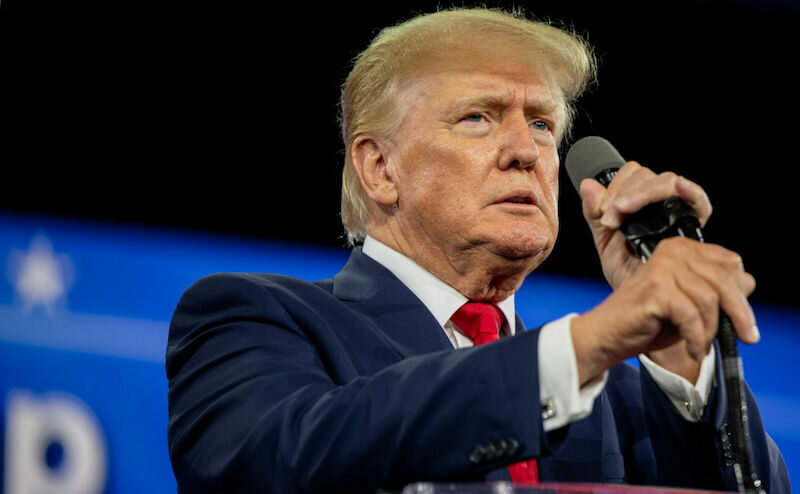(LifeSiteNews) — Former U.S. President Donald Trump on Wednesday pledged to prohibit the creation of a Central Bank Digital Currency (CBDC) if re-elected president.
President Trump: “Tonight, I am also making another promise to protect Americans from government tyranny. As your president, I will never allow the creation of a Central Bank Digital Currency.” pic.twitter.com/pg2z5M1VkO
— Trump War Room (@TrumpWarRoom) January 18, 2024
“Tonight, I am also making another promise to protect Americans from government tyranny. As your president, I will never allow the creation of a Central Bank Digital Currency,” Trump told a crowd during a campaign event in New Hampshire.
“Such a currency would give a federal government — our federal government — absolute control over your money,” Trump warned regarding CBDCs. “They could take your money, and you wouldn’t even know it was gone.”
“This would be a dangerous threat to freedom, and I will stop it from coming to America,” Trump vowed.
Trump follows in the footsteps of presidential contender and Florida Gov. Ron DeSantis as well as former GOP presidential candidate Vivek Ramaswamy, who have both declared they would oppose CBDCs as president.
DeSantis has a particularly strong record of opposition to CBDCs. In May, he signed legislation to ban “the use of a federally adopted central bank digital currency (CBDC) by excluding it from the definition of money within Florida’s Uniform Commercial Code” and “foreign-issued CBDC to protect consumers against globalist efforts to adopt a worldwide digital currency.”
Eswar Prasad, senior professor of trade policy at Cornell University, admitted last year during a World Economic Forum (WEF) summer meeting that CBDCs can be used by governments to control purchases, and he confessed that he sees such power as a positive development.
“You could have, as I argue in my book, a potentially better — some might see it as a darker world — where the government decides that units of central bank money can be used to purchase some things but not other things that it deems less desirable, like say ammunition or drugs or pornography or something of the sort,” Prasad said. “And that is very powerful in terms of the use of a CBDC.”
The U.S. government has already declared it is pulling out all the stops to develop and issue a CBDC. Executive Order 14067, issued March 9, 2022, declared that the Biden administration “places the highest urgency on research and development efforts into the potential design and deployment options of a United States CBDC,” and called for an analysis of its “potential implications.”
While White House announcements do not yet indicate when such a CBDC would be developed and implemented, financial adviser Joe Brown is warning that the infrastructure for a U.S. CBDC is already being quietly developed in the form of a digital instant payments service called FedNow. The service, launched in July 2023, allows “24/7 settlement… that happens instantly from bank to bank.”
“This infrastructure bypasses a lot of the need for the current banking infrastructure, which is the purpose of a central bank digital currency,” Brown explained on his video blog, arguing that FedNow paves the way for a CBDC by having everyone “open an account directly with the Federal Reserve, the central bank.”
“This transforms the purpose of the entire banking system really into infrastructure for the CBDC,” continued Brown, noting that it would “centralize everything under one roof.”
“And once that system is built, once all the kinks are worked out of the system… then they will have the foundation in place to build the Gen 2, the Version 2 CBDC on top of it. The only thing that would be left to do would be to have everybody open an account directly with the Fed.”
Last year, Republican U.S. House Majority Whip Tom Emmer of Minnesota reintroduced the CBDC Anti-Surveillance State Act after a failed first attempt, citing concerns that such a move could be used to violate Americans’ privacy or control their economic choices. He pointed out that in both China and Canada, personal finances have been used to punish and control citizens.
“In China, the Communist Party is using a central bank digital currency to track the spending habits of its citizens. The data is being used to create a social credit system that rewards or punishes people based on their behavior,” Emmer stated.
“Closer to home in the Western Hemisphere, in Canada, the Trudeau Administration froze the bank accounts of individuals involved in the 2022 trucker protests,” he continued. “That might work in Canada; that doesn’t work here.”
Emmer’s legislation, H.R.5403, would forbid U.S. Federal Reserve banks from “issu[ing] a central bank digital currency, or any digital asset that is substantially similar under any other name or label, directly to an individual.”
The bill cleared the U.S. House Financial Services Committee on September 20 in a 27-20 vote, but it has not yet progressed further.

